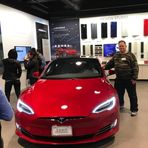Volvo Cars: Steering Towards a Sustainable Future
September 5, 2024, 4:15 pm

Location: United States, Texas, Austin
Employees: 10001+
Founded date: 2003
Total raised: $3.86B
Volvo Cars is at a pivotal crossroads, charting a course through the electrification landscape. The Swedish automaker is not just a car manufacturer; it’s a harbinger of change in the automotive industry. With a commitment to sustainability and innovation, Volvo is transforming its ambitions to meet the demands of a rapidly evolving market.
The company has already launched five fully electric models, including the EX90, and plans to introduce five more. This ambitious lineup is part of Volvo's long-term vision to become a fully electric car manufacturer by 2030. However, recent adjustments reflect a pragmatic approach to market realities. The new target is for 90 to 100 percent of global sales to consist of electrified vehicles by 2030, which includes both fully electric and plug-in hybrid models. The remaining 0-10 percent will allow for a limited number of mild hybrids.
This shift comes as the market for electric vehicles (EVs) faces challenges. The rollout of charging infrastructure has been slower than anticipated, and government incentives are waning in some regions. These factors have prompted Volvo to adopt a more flexible strategy, ensuring that it remains an industry leader while adapting to customer preferences.
Volvo's commitment to sustainability is unwavering. The company aims to achieve net-zero greenhouse gas emissions by 2040. Its updated CO2 reduction targets are ambitious yet realistic, aiming for a 65-75 percent reduction in emissions per car by 2030, down from the previous 75 percent goal. This commitment extends beyond the vehicles themselves; Volvo is working with suppliers to reduce emissions throughout its supply chain.
The excitement surrounding Volvo's electric offerings is palpable. The EX30, a compact SUV, is gaining traction in Europe, and the EX90 is set to redefine the brand's image. The EX90 is not just another electric vehicle; it represents a paradigm shift in technology and safety. With advanced features powered by NVIDIA's DRIVE Orin system-on-chip, the EX90 is a testament to Volvo's dedication to innovation.
Volvo's collaboration with NVIDIA is a cornerstone of its strategy. The partnership aims to integrate cutting-edge technology into every vehicle. The upcoming DRIVE Thor chip, capable of processing a staggering 1,000 trillion operations per second, will further enhance the capabilities of future models. This technology will enable advanced driving assistance systems and autonomous driving features, making Volvo cars safer and more connected.
The company is also embracing a new manufacturing approach with "megacasting." This technique allows for the production of large aluminum components, reducing the number of individual parts and cutting costs. By streamlining production, Volvo can increase efficiency and sustainability, utilizing more recycled materials in the process.
Volvo's sales figures reflect its growing influence in the EV market. In August 2024, global sales rose by 3 percent, driven by a 47 percent increase in electrified models. In Europe, sales of fully electric cars surged by 137 percent. The XC60 remains a top seller, but the EX30 is quickly becoming a favorite among consumers.
Despite challenges in the Chinese market, where sales dipped by 23 percent, Volvo's overall performance remains strong. The company is adapting to local market conditions while maintaining its commitment to electrification. In the U.S., sales of plug-in hybrids increased by 84 percent, indicating a growing acceptance of electrified vehicles.
Volvo's strategy is not just about selling cars; it's about creating a sustainable future. The company’s mission is to provide people with the freedom to move in a personal, sustainable, and safe way. This vision is reflected in its commitment to reducing its carbon footprint and investing in innovative technologies.
As Volvo Cars moves forward, it remains focused on value creation. The company aims to outpace the premium car market while achieving a core EBIT margin of 7-8 percent by 2026. This financial prudence will support its ambitious electrification goals and ensure long-term sustainability.
In conclusion, Volvo Cars is steering towards a future defined by electrification and innovation. The company is not just adapting to change; it is leading the charge. With a robust lineup of electric vehicles, strategic partnerships, and a commitment to sustainability, Volvo is poised to redefine the automotive landscape. The road ahead may be challenging, but with its clear vision and determination, Volvo Cars is ready to navigate the twists and turns of the evolving market. The future is electric, and Volvo is at the forefront of this transformation.
The company has already launched five fully electric models, including the EX90, and plans to introduce five more. This ambitious lineup is part of Volvo's long-term vision to become a fully electric car manufacturer by 2030. However, recent adjustments reflect a pragmatic approach to market realities. The new target is for 90 to 100 percent of global sales to consist of electrified vehicles by 2030, which includes both fully electric and plug-in hybrid models. The remaining 0-10 percent will allow for a limited number of mild hybrids.
This shift comes as the market for electric vehicles (EVs) faces challenges. The rollout of charging infrastructure has been slower than anticipated, and government incentives are waning in some regions. These factors have prompted Volvo to adopt a more flexible strategy, ensuring that it remains an industry leader while adapting to customer preferences.
Volvo's commitment to sustainability is unwavering. The company aims to achieve net-zero greenhouse gas emissions by 2040. Its updated CO2 reduction targets are ambitious yet realistic, aiming for a 65-75 percent reduction in emissions per car by 2030, down from the previous 75 percent goal. This commitment extends beyond the vehicles themselves; Volvo is working with suppliers to reduce emissions throughout its supply chain.
The excitement surrounding Volvo's electric offerings is palpable. The EX30, a compact SUV, is gaining traction in Europe, and the EX90 is set to redefine the brand's image. The EX90 is not just another electric vehicle; it represents a paradigm shift in technology and safety. With advanced features powered by NVIDIA's DRIVE Orin system-on-chip, the EX90 is a testament to Volvo's dedication to innovation.
Volvo's collaboration with NVIDIA is a cornerstone of its strategy. The partnership aims to integrate cutting-edge technology into every vehicle. The upcoming DRIVE Thor chip, capable of processing a staggering 1,000 trillion operations per second, will further enhance the capabilities of future models. This technology will enable advanced driving assistance systems and autonomous driving features, making Volvo cars safer and more connected.
The company is also embracing a new manufacturing approach with "megacasting." This technique allows for the production of large aluminum components, reducing the number of individual parts and cutting costs. By streamlining production, Volvo can increase efficiency and sustainability, utilizing more recycled materials in the process.
Volvo's sales figures reflect its growing influence in the EV market. In August 2024, global sales rose by 3 percent, driven by a 47 percent increase in electrified models. In Europe, sales of fully electric cars surged by 137 percent. The XC60 remains a top seller, but the EX30 is quickly becoming a favorite among consumers.
Despite challenges in the Chinese market, where sales dipped by 23 percent, Volvo's overall performance remains strong. The company is adapting to local market conditions while maintaining its commitment to electrification. In the U.S., sales of plug-in hybrids increased by 84 percent, indicating a growing acceptance of electrified vehicles.
Volvo's strategy is not just about selling cars; it's about creating a sustainable future. The company’s mission is to provide people with the freedom to move in a personal, sustainable, and safe way. This vision is reflected in its commitment to reducing its carbon footprint and investing in innovative technologies.
As Volvo Cars moves forward, it remains focused on value creation. The company aims to outpace the premium car market while achieving a core EBIT margin of 7-8 percent by 2026. This financial prudence will support its ambitious electrification goals and ensure long-term sustainability.
In conclusion, Volvo Cars is steering towards a future defined by electrification and innovation. The company is not just adapting to change; it is leading the charge. With a robust lineup of electric vehicles, strategic partnerships, and a commitment to sustainability, Volvo is poised to redefine the automotive landscape. The road ahead may be challenging, but with its clear vision and determination, Volvo Cars is ready to navigate the twists and turns of the evolving market. The future is electric, and Volvo is at the forefront of this transformation.


